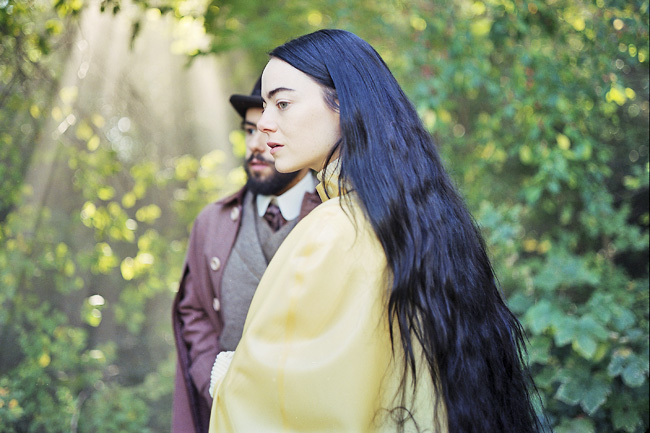AP – Filmmaker Yorgos Lanthimos and his star, Emma Stone, have a good and strange thing going in Poor Things whether she’s playing a striving scullery maid who works her way into the favour of Queen Anne, or a re-animated Victorian woman finding independence.
Stone helps make his black humour more accessible, and he creates unorthodox opportunities for her to play and stretch. We, the audience, are the benefactors.
Poor Things was not a whole cloth invention. It is an adaptation of Alasdair Gray’s 1992 novel, done by The Favourite screenwriter Tony McNamara whose edges and wit haven’t dulled and in fact flourishes outside the cruelty of the previous film. Don’t worry, the humour is plenty dark here, but self-actualisation looks good on them.
In this depraved and not so subtle fairy tale, men see Bella as a thing to possess and control. Her creator, Dr Godwin Baxter (Willem Dafoe), a mad scientist with violent scars all over his face from a childhood as test subject for his own father, wants to hide her away from the corrupting influences of the world.
His horrified student Max McCandles (Ramy Youssef), enlisted to study Bella, wants her to be his wife. And the dandy attorney Duncan Wedderburn (Mark Ruffalo) sees a doll, someone with the potential to be as wild and adventuresome as him and eschew the conventional stuffiness of their time. Everyone assumes that Bella will not be too much of a problem. And everyone is wrong.

It wouldn’t be a Lanthimos movie without some immense, irreconcilable discomfort, like using a woman with the mind of a toddler for comedic purposes. But this is hardly the first fairy tale to exploit its heroine for her innocence or naivete. Does it make it better if that’s the point? Or is this the prickly post-film debate that everyone is supposed to be having? That is something only the individual can answer.
Stone moves like a doll who hasn’t quite figured out she has joints yet and talks in incomplete, childish sentences. She is not actually mimicking a toddler, it’s something weirder and more fantastical than that. In La La Land she moved as though walking on air.
In Poor Things, there is a marionette quality.
And Bella evolves quickly. She learns to walk and speak and think and dance and read and philosophise about inequalities. It does not ever occur to her to not do, or say, exactly what she pleases in this opera of appetites. And her evolution is appropriately messy, taking her to Portugal, Alexandria and Paris, as she figures out her likes and dislikes. You almost want to see her go up against the mean teens in Barbie. Social mores really are the dullest things.
This story exists in a Victorian dream/nightmare, a vision so stuffed with fantasy it reminded me of The Adventures of Baron Munchausen. But it is undoubtedly among the year’s most sumptuous visual delights with production design by James Price and Shona Heath, and costumes by Holly Waddington. – Lindsey Bahr



